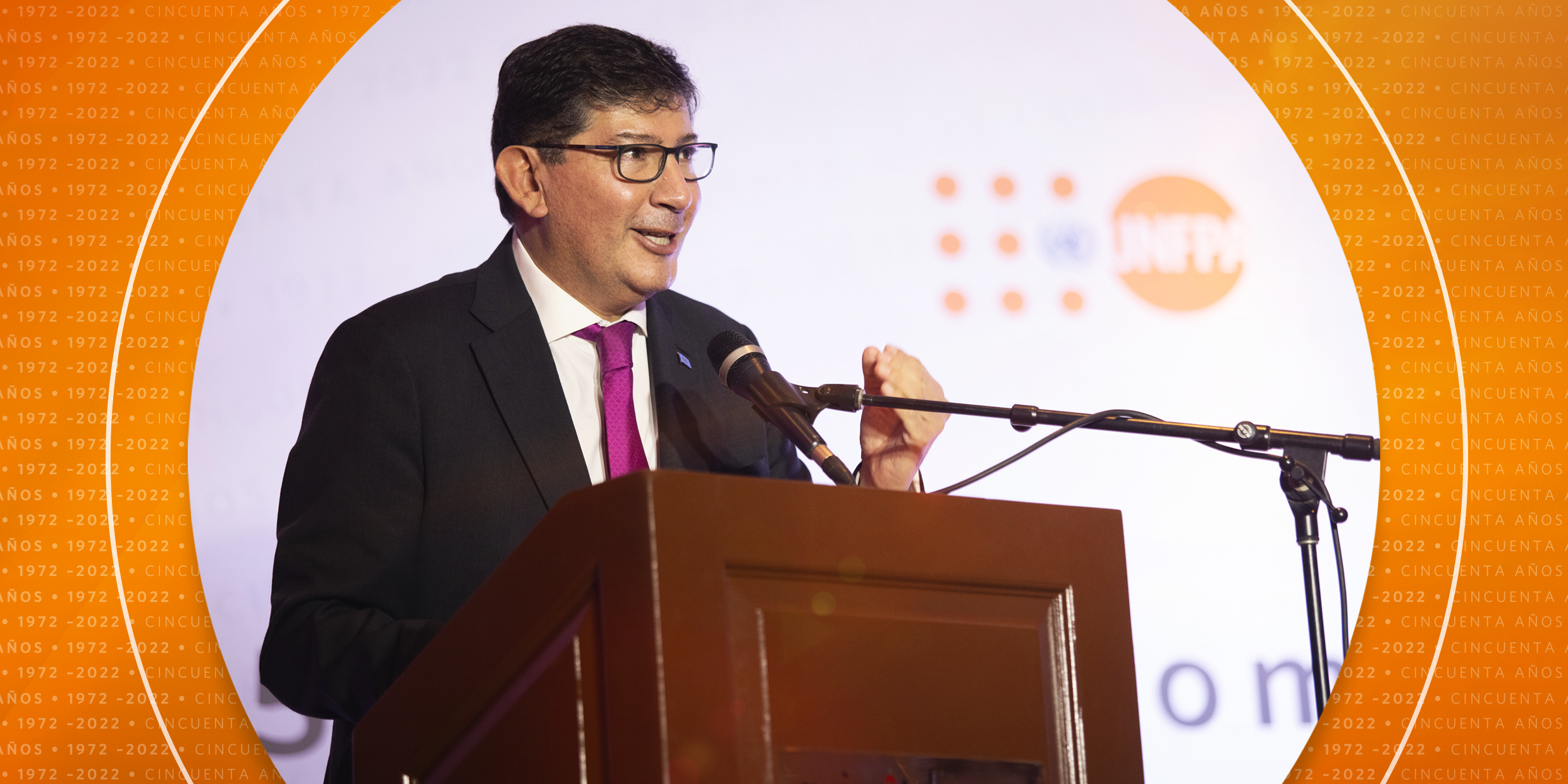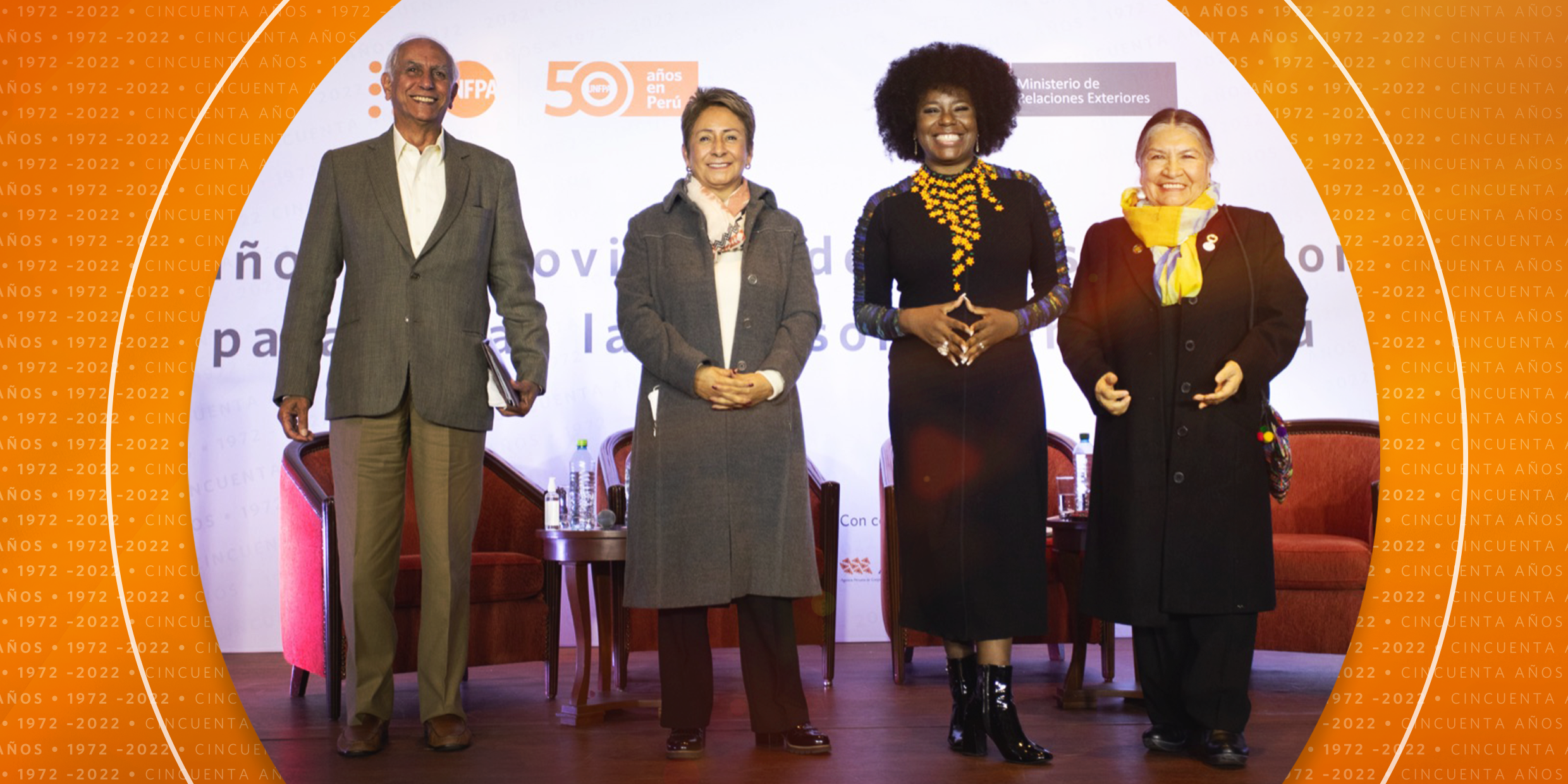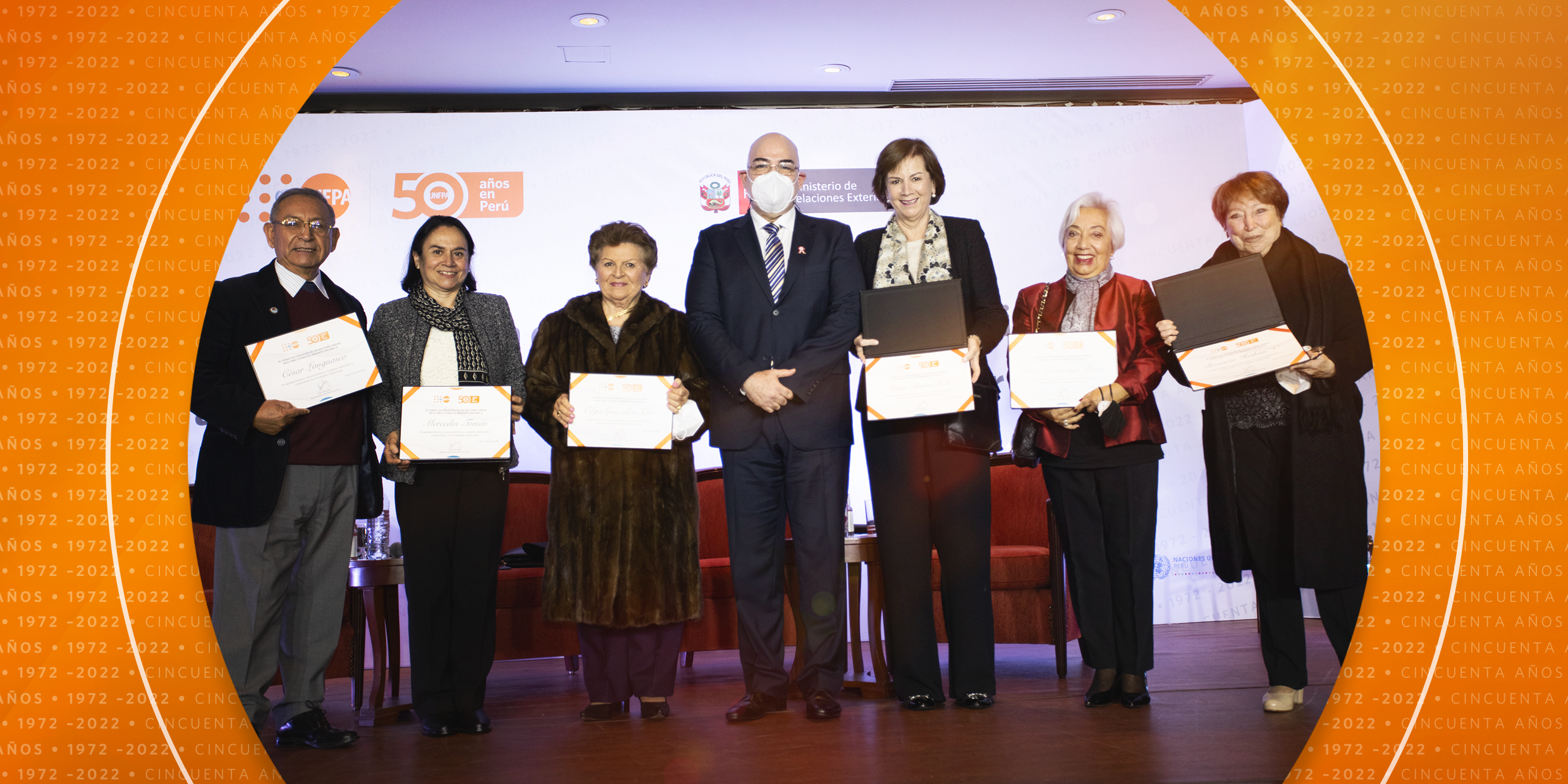World Population Day is commemorated every July 11. This year, the United Nations Population Fund (UNFPA) in Peru joined this noteworthy date with the celebration of its 50 years in the country, in an event co-organized with the Ministry of Foreign Affairs and in collaboration with the Peruvian Agency for International Cooperation (APCI), the Ministry of Women and Vulnerable Populations, the National Institute of Statistics and Informatics (INEI) and the Center for Indigenous Cultures of Peru (CHIRAPAQ). The event was titled “50 years promoting rights and options for all people in Peru”.

On the evening of Monday, the 11th, over 150 guests, including public officials from the three branches of government, specialists, UNFPA collaborators, representatives from the private sector and academia, activists, and the general public, attended the event held in San Isidro, Lima. The event counted with the participation of over 10 speakers and panelists, who commented on the progress achieved in the last decades and addressed the challenges for the next five years so that no one is left behind.
Recognition of UNFPA's contribution to Peru
At the beginning of the ceremony, as attendees took in their respective places, a panel on the stage recounted with audiovisual images and a long timeline, the main milestones and events related to UNFPA's agenda in Peru and the world. Events such as the opening of its office in Peru (1972), the World Population Conference in Bucharest (1974), the International Conference on Population and Development in Cairo (1994), and the adoption of the Montevideo Consensus (2013), among others.

Ambassador Luis Enrique Chávez Basagoitia, Vice Minister of Foreign Affairs, gave the first speech of the night. After commemorating “50 years of joint work between Peru and the United Nations Population Fund”, the Vice Minister highlighted the contribution of UNFPA in favor of women, adolescents and girls. “UNFPA's work has been crucial to know in detail the special situation of women's vulnerability (...) And it has been very important to encourage the promotion and respect for human rights, especially to ensure the universal right to sexual and reproductive health and reproductive rights”.
The Vice-Chancellor also emphasized the work for the implementation of the 2030 Agenda, “particularly with regard to reducing maternal mortality, reducing the transmission of sexual diseases, and guaranteeing universal access to sexual and reproductive health services”. Additionally, he stressed UNFPA's 2022-2026 Country Program, which “seeks to achieve measurable results in terms of distribution of unmet need for family planning, reduction of preventable maternal deaths, and prevention of gender violence in our country”.
Chávez Basagoitia's intervention was followed by the Minister of Women and Vulnerable Populations (MIMP), Mrs. Diana Miloslavich. The Minister took the first few minutes to emphasize the importance of commemorating World Population Day. She then stressed that the United Nations Population Fund in Peru was one of the first international organizations to support and provide technical and specialized assistance to the ministry she now directs since its creation in 1996 as the Ministry for the Promotion of Women and Human Development.

During her participation, Miloslavich also highlighted UNFPA's support for the preparation and approval of the National Population Plan 2010-2021 in Peru—the only country in the Latin American and Caribe region to promote its implementation—, as well as for the construction of the Control Panel of the Montevideo Consensus on Population and Development.
“For over 25 years we have been working together to achieve effective prevention, protection and care against violence against women, the institutionalization of the gender perspective in public and sectoral policies, and the protection, promotion, exercise and guarantee of the rights of vulnerable populations,” she emphasized.

Then it was Mr. Igor Garafulic’s turn. The Resident Coordinator of the United Nations in Peru was thrilled to meet in person with different colleagues, some of whom he only knew through virtual platforms due to the pandemic. However, he acknowledged and praised that “they never stopped working together”.
Garafulic agreed with Vice Minister Chávez on the importance of the UNFPA 2022-2026 Country Program, aligned with the 2030 Agenda, and was optimistic about its scope. He stated that “in Peru, I have been able to see firsthand the excellent work done by the Population Fund in areas that are essential for the development of people”. He assured that “this work is highly valued by our government counterparts, our partners in civil society, private sector, academia, and international cooperation”.

Statistics for better decision-making
After the artistic presentation, Mr. Dante Carhuavilca, Head of the National Institute of Statistics and Informatics (INEI), shared interesting data included in the newest publication “Peru: 50 years of population changes, challenges and opportunities”. Carhuavilca highlighted one specific data: since 1972–the date of the arrival of UNFPA in Peru–, there has been a reduction in the annual growth rate of the number of children born to Peruvian mothers.
After this rich presentation on the interrelationships between demographic megatrends, social development and exercise of human rights for all people, which left reflections for the audience, Mrs. Grecia Rojas, Vice Minister of Vulnerable Populations and Technical Secretary of the Multisectoral Commission for the Monitoring and Evaluation of the Montevideo Consensus, took the floor. Mrs. Rojas also emphasized the statistical issue, particularly the Dashboard as a tool for better decision-making and the development of evidence-based public policies that, in turn, address the needs of the various population groups.
“The Dashboard offers a single access to over 100 indicators and 108 measures on nine topics applied as priorities in the Montevideo Consensus. Relevant topics such as sexual and reproductive health, gender equality, the rights of children and adolescents, international migration, indigenous peoples, among others,” she noted.
Precisely as a result of the figures and platforms presented, the event continued with a panel that commented on the progress and challenges regarding population and development issues. The attendees were able to listen to the reflections of María Pía Molero, Vice Minister of Women; Susana Chávez, Executive Director of the Center for the Promotion and Defense of Sexual and Reproductive Rights (Promsex); Javier Abugattás, international development expert and former President of the Board of Directors of the National Center for Strategic Planning (CEPLAN); Tarcila Rivera, President of the Board of Directors of CHIRAPAQ and Executive President of the International Forum of Indigenous Women; and, as moderator, Sofia Carrillo, journalist, sexual and reproductive rights activist.

Looking at the past to project oneself forward
The evening continued with more speeches to commemorate World Population Day and the 50th anniversary of the United Nations Population Fund in Peru. Mr. José Antonio González Norris, Executive Director of the Peruvian Agency for International Cooperation (APCI) highlighted UNFPA's leadership and capacity for achieving its goals and tasks based on the latest evaluation report of the IX Country Program 2017-2021. “We can affirm that the program has decisively contributed to the achievement of transformative results and has demonstrated its effectiveness in generating policy dialogue and articulating capacity-building strategies, as well as gathering evidence,” he said.
This way, “UNFPA contributed to the exercise of rights to maternal health care, family planning, prevention of adolescent pregnancy, the fight against sexual violence, and the assurance of minimum support of sexual and reproductive health in humanitarian and emergency contexts” in Peru, Gonzales added.

For the closing of the event, Mr. Hugo González, Representative of the United Nations Population Fund in Peru and Country Director for Chile, reflected on the importance of analyzing demographic changes in Peru from a human perspective. “The capacity for demographic resilience will depend on policies that address structural challenges beyond numbers (...) People are the solution, not the problem,” he said.



